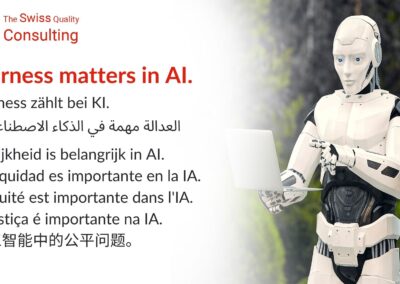Strategies for Upholding Fairness in AI Systems
Introduction to Fairness in AI Development
Fairness in AI development is crucial to ensuring that artificial intelligence systems do not perpetuate or exacerbate existing social inequalities. As AI becomes increasingly integrated into various sectors, from healthcare to finance, addressing issues of fairness and bias is imperative. This is particularly important in technologically advanced regions such as Saudi Arabia, UAE, Riyadh, and Dubai, where AI-driven innovations are pivotal to business success and modern technology adoption.
Ensuring fairness in AI development involves creating algorithms that are transparent, accountable, and unbiased. For business executives, mid-level managers, and entrepreneurs, understanding and implementing these principles is essential for maintaining trust and achieving ethical AI deployment. By adopting fairness-focused practices, organizations can prevent discriminatory outcomes and foster a culture of inclusivity and equality.
Incorporating fairness into AI systems requires a multifaceted approach that addresses various stages of AI development, from data collection to model deployment. By exploring these elements, businesses in the Middle East can lead the way in ethical AI innovation, setting an example for global markets and driving social progress.
Data Collection and Preprocessing for Fair AI
The foundation of fair AI development lies in the data used to train machine learning models. Ensuring that this data is representative and free from biases is the first step towards creating fair AI systems. In regions like Saudi Arabia and the UAE, where diversity is a key characteristic, businesses must prioritize the collection of inclusive and comprehensive datasets.
To achieve fairness in data collection, organizations should implement robust data governance frameworks that emphasize diversity and inclusivity. This involves sourcing data from a wide range of demographics and ensuring that minority groups are adequately represented. Additionally, businesses should conduct thorough audits to identify and rectify any existing biases in their datasets.
Data preprocessing is another critical aspect of fair AI development. This stage involves cleaning and transforming raw data to make it suitable for training AI models. During preprocessing, organizations should employ techniques to mitigate biases, such as re-sampling, re-weighting, and using fairness-aware algorithms. By addressing biases at the data level, businesses can significantly reduce the risk of biased outcomes in their AI systems.
Algorithm Design and Fairness
Algorithm design plays a pivotal role in ensuring fairness in AI development. AI algorithms must be designed to treat all individuals and groups equitably, without favoring any particular demographic. In technologically progressive regions like Riyadh and Dubai, businesses must invest in developing and deploying fair algorithms to maintain their reputation and social responsibility.
One approach to achieving fairness in algorithm design is through the implementation of fairness constraints. These constraints ensure that the AI model’s predictions do not disproportionately benefit or harm specific groups. Fairness constraints can be incorporated during the training phase, guiding the model to produce equitable outcomes.
Moreover, businesses should focus on creating interpretable and transparent AI models. Transparency allows stakeholders to understand how AI decisions are made, fostering trust and accountability. Interpretable models provide insights into the factors influencing AI predictions, enabling organizations to detect and address potential biases. By prioritizing transparency and interpretability, businesses can enhance the fairness of their AI systems and build stakeholder confidence.
Continuous Monitoring and Evaluation of AI Systems
Fairness in AI development is not a one-time effort but an ongoing process that requires continuous monitoring and evaluation. Once AI systems are deployed, businesses must regularly assess their performance to ensure that they remain fair and unbiased. In dynamic markets like Saudi Arabia and the UAE, where technology evolves rapidly, continuous evaluation is crucial for maintaining ethical AI practices.
Continuous monitoring involves tracking the AI system’s outputs and examining them for signs of bias or unfairness. This can be achieved through the implementation of fairness metrics, which quantify the extent to which the system’s predictions are equitable. By analyzing these metrics, businesses can identify areas where the AI system may need improvement and take corrective actions.
Additionally, businesses should establish feedback loops that involve stakeholders in the evaluation process. This includes soliciting input from users, customers, and regulatory bodies to gain diverse perspectives on the AI system’s performance. By incorporating stakeholder feedback, organizations can ensure that their AI systems align with societal values and expectations.
Ethical Leadership and Organizational Culture
Promoting fairness in AI development requires strong ethical leadership and a culture of inclusivity within the organization. Business leaders in regions like Riyadh and Dubai must champion fairness and set the tone for ethical AI practices. This involves fostering an environment where ethical considerations are integral to decision-making and innovation.
Ethical leadership includes providing training and resources for employees to understand and implement fairness principles in AI development. Organizations should encourage continuous learning and collaboration, enabling teams to stay updated on the latest advancements in fairness and ethics. By empowering employees with knowledge and tools, businesses can drive a culture of fairness and accountability.
Moreover, organizations should establish clear ethical guidelines and policies that outline their commitment to fairness in AI development. These guidelines should be communicated transparently to all stakeholders, reinforcing the organization’s dedication to ethical practices. By embedding fairness into their organizational culture, businesses can ensure that their AI initiatives are guided by integrity and social responsibility.
Future Directions in Fair AI Development
The future of fairness in AI development lies in continuous innovation and collaboration. As AI technologies evolve, businesses must remain proactive in addressing emerging fairness challenges and opportunities. In regions like Saudi Arabia and the UAE, ongoing investment in AI research and development provides a unique opportunity to lead in fair AI practices and set global standards.
Emerging technologies such as Generative AI and Blockchain offer new avenues for enhancing fairness in AI systems. Generative AI can be used to create diverse and representative datasets, while Blockchain can provide transparent and immutable records of AI decision-making processes. By leveraging these technologies, businesses can enhance the fairness and accountability of their AI systems.
Furthermore, businesses should engage in cross-industry collaborations to share best practices and develop standardized fairness frameworks. Collaborative efforts can drive the adoption of fair AI practices across different sectors, fostering a more inclusive and equitable technological landscape. By working together, businesses can contribute to the global advancement of fair AI development and drive positive social change.
Conclusion: Commitment to Fairness in AI Development
Ensuring fairness in AI development is essential for preventing social inequalities and fostering trust in technological systems. For businesses in Saudi Arabia, UAE, Riyadh, and Dubai, adopting a comprehensive fairness framework can drive ethical AI innovation and enhance business success. By prioritizing diverse data collection, transparent algorithm design, continuous monitoring, and ethical leadership, organizations can create AI systems that are fair, accountable, and inclusive.
As technology continues to evolve, businesses must remain vigilant and proactive in addressing fairness challenges. By staying ahead of these considerations and involving stakeholders in the decision-making process, organizations can ensure that their AI strategies align with ethical principles. This commitment to fairness will not only enhance trust and accountability but also position businesses as leaders in responsible innovation, contributing to their long-term success and positive societal impact.
—
#FairnessInAI #AIDevelopment #SocialInequalities #ArtificialIntelligence #ModernTechnology #BusinessSuccess #SaudiArabia #UAE #Riyadh #Dubai























